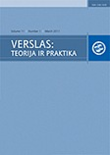Group-Tacit Knowledge and Organisational Effectiveness: Analysis of Effects Using a Mixed Method Approach
Group-Tacit Knowledge and Organisational Effectiveness: Analysis of Effects Using a Mixed Method Approach
Author(s): Ayodotun Stephen Ibidunni, Maxwell Ayodele OLOKUNDUN, Deborah Bolanle Motilewa, Tolulope Morenike Atolagbe, Omotayo Adewale OsibanjoSubject(s): Business Economy / Management, Micro-Economics, Methodology and research technology, Economic development, ICT Information and Communications Technologies
Published by: Vilnius Gediminas Technical University
Keywords: group-tacit knowledge; organisational knowledge; organisational effectiveness; telecommunication; knowledge management; mixed method research;
Summary/Abstract: Considering that most part of organisational operations depend on group effectiveness, yet there is scarcely any empirical study on the interactions between group-tacit knowledge and organisational effectiveness. In order to overcome this gap, this study involves a survey of 230 managers and other administrative & technical employees of the four major firm in the Global System for Mobile Communication (GSM) sub-market of Nigeria’s telecommunications industry. Data was gathered using a mixed method research approach. Correlation, Regression, Analysis of Variance (ANOVA) statistics and thematic analysis was carried out as means of testing the hypothesis for this research study. The findings showed that firms need to focus keenly on ideas of employees that are shared during conferences, team leaders’ mentoring role, collective reasoning over task and constantly hold strategic meetings that probe into developments arising in each functional unit of the organisation. These factors are shown to have a strong influence on organisational effectiveness.
Journal: Verslas: teorija ir praktika
- Issue Year: 19/2018
- Issue No: 1
- Page Range: 135-145
- Page Count: 11
- Language: English

